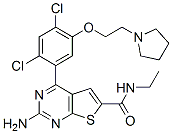All AbMole products are for research use only, cannot be used for human consumption.

VER-82576 (NVP-BEP800) is a potent, orally available and selective inhibitor of Hsp90β with an IC50 of 58 nM. VER-82576 also slightly blocks Grp94 and Trap-1, with IC50s of 4.1 and 5.5 μM, respectively. In A375 melanoma and BT-474 breast cancer cell lines, VER-82576 (NVP-BEP800) induced client protein degradation (including ErbB2, B-Raf(V600E), Raf-1, and Akt) and Hsp70 induction. Oral administration of NVP-BEP800 was well tolerated and induced robust antitumor responses in tumor xenograft models, including regression in the BT-474 breast cancer model. In these tumor models, NVP-BEP800 modulated Hsp90 client proteins and downstream signaling pathways at doses causing antitumor activity. NVP-BEP800 (VER-82576) can radiosensitise tumour cell lines of different entities through destabilisation and depletion of several Hsp90 client proteins, thus causing the depletion of S phase and G2/M arrest, increased DNA damage and repair protraction and, to some extent, apoptosis. VER-82576 (15 or 30 mg/kg, p.o.) shows antitumor activities in A375 cancer xenografts and BT-474 xenograft-bearing mice.
| Cell Experiment | |
|---|---|
| Cell lines | BT-474, SKBr3, MCF-7, MDA-MB-157, MDA-MB-231, MDA-MB-468 and BT20 cells line |
| Preparation method | Cell proliferation was determined using either sulforhodamine B for adherent cells or MTS assay for suspension cells or those showing low adherence. GI50 was the compound concentration that inhibits cell growth by 50% compared with vehicle control. |
| Concentrations | 0~1 μ M |
| Incubation time | 24 h |
| Animal Experiment | |
|---|---|
| Animal models | T-474 tumor xenografts in nude mice |
| Formulation | 0.5% methyl cellulose |
| Dosages | 30 mg/kg qd for 2 weeks |
| Administration | PO. |
| Molecular Weight | 480.41 |
| Formula | C21H23Cl2N5O2S |
| CAS Number | 847559-80-2 |
| Solubility (25°C) | DMSO 5 mg/mL Ethanol 10 mg/mL |
| Storage |
Powder -20°C 3 years ; 4°C 2 years In solvent -80°C 6 months ; -20°C 1 month |
| Related HSP Products |
|---|
| NCT-58
NCT-58 is a potent inhibitor of C-terminal HSP90. |
| Gedunin
Gedunin is a limonoid with anti-cancer, anti-viral, anti-inflammatory and insecticidal activities. |
| VER-49009
VER-49009 is a Hsp90 inhibitor, with an IC50 of 25 nM and a Kd of 78 nM. |
| YUM70
YUM70 is a potent and selective inhibitor of glucose-regulated protein 78 (GRP78), with an IC50 of 1.5 μM for inhibiting GRP78 ATPase activity. YUM70 induces endoplasmic reticulum stress-mediated apoptosis in pancreatic cancer. |
| Hsp70-derived octapeptide
Hsp70-derived octapeptide is a conserved octapeptide of the C-terminal end of Hsp70, which physically interacts with tetratricopeptide repeat (TPR) motifs. |
All AbMole products are for research use only, cannot be used for human consumption or veterinary use. We do not provide products or services to individuals. Please comply with the intended use and do not use AbMole products for any other purpose.


Products are for research use only. Not for human use. We do not sell to patients.
© Copyright 2010-2024 AbMole BioScience. All Rights Reserved.
